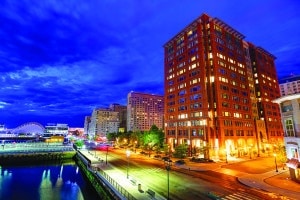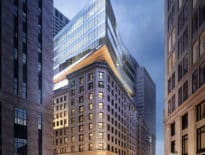A new survey has found significant numbers of Boston’s black and Latino residents see the Seaport as a hostile and unwelcoming place, and many city residents feel the area is too expensive and exclusive.
The poll by the Conservation Law Foundation and the MassINC Polling Group surveyed 953 Boston residents online between May 24 and June 9. Results were weighted to known population parameters on age, gender, race, neighborhood, and educational attainment.
The poll found black residents are four times more likely to feel unwelcome than white residents on the waterfront. In the survey, residents were asked about their attitudes regarding all of Boston’s waterfront areas, including downtown, South Boston, Dorchester and East Boston, but it was clear from many of the open-ended responses that they associate the waterfront with the Seaport, the CLF said in a statement.
The survey found that, in the minority-majority city, 65 percent of white residents have visited waterfront areas three or more times over the last year, compared to 44 percent of non-whites. Additionally, only six percent of white people feel the waterfront is unwelcoming compared to 24 percent of black residents and 20 percent of Latino respondents who feel unwelcome in waterfront areas.
“The waterfront and Boston Harbor belong to all of us, not just the white and wealthy,” CLF President Bradley Campbell said in a statement. “Too many developers have been allowed to wall off access to the water for the benefit of a few, and the rest of the city is finally taking note. We all paid for the cleanup of Boston Harbor and we all deserve equal access to it.”
Overall, 47 percent of the 953 respondents said that there was not enough affordable parking near the waterfront, while 37 percent said dining and activities were too expensive. Travel to waterfront areas was also named as a problem, with 33 percent surveyed saying public transportation takes too long.
Forty-two percent of respondents said a lack of affordable dining options and attractions was the biggest threat to the waterfront. The survey also found 40 percent of Boston residents saw “overdevelopment” as the greatest threat to the waterfront, while only 24 percent saw climate change as the biggest problem.
To improve the waterfront, respondents said several ideas would make them “much more likely” to visit the waterfront:
- More affordable dining options (61 percent)
- Discounts at museums and cultural institutions (59 percent)
- Improving public transit in the area (56 percent)
- Better publicity for waterfront events (47 percent)
- More opportunities for everyday people to go boating, kayaking or fishing (46 percent)
- More benches and places to sit (45 percent)
- Better signage identifying the free, public parts of the waterfront (44 percent)




 |
| 


